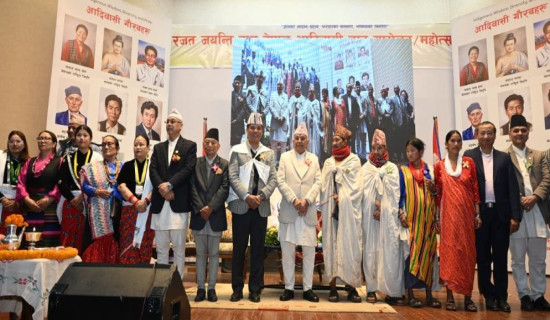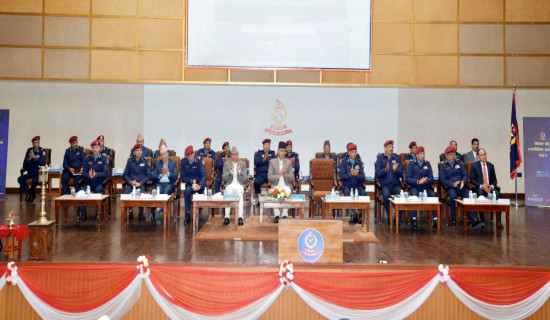- Monday, 9 February 2026
Home-grown technology can revolutionise potato farming
Banepa, Aug. 11: Can you believe potatoes can be cultivated in the air? Yes, it might sound surprising, but there's a method called "Aeroponic" cultivation that allows certain plants, including potatoes, to be grown in the air without soil.
In Aeroponic systems, the plant's roots are suspended in a chamber where they receive a nutrient-rich mist, providing them with the necessary nutrients and oxygen to grow. The method is particularly efficient for producing disease-free plantlets or mini tubers in the case of potatoes.
The innovative technologies developed at Kathmandu University (KU) offer a breakthrough in potato seed production, potentially transforming Nepal's agricultural landscape.
A team of researchers led by Prof. Dhurva Prasad Gauchan from the KU introduced a “Low-cost mass production technology of virus-free pre-basic seed of potato” which is hoped to improve potato seed production and help farmers grow healthier and more abundant crops.
Due to the higher demand for high-quality potato seeds than the available supply, the team has introduced the Temporary Immersion System (TIS) and Aeroponic Technology. These methods aim to revolutionise the production of disease-free pre-basic potato seeds.
Potatoes are not just a dietary staple but also a significant agricultural commodity in Nepal, contributing 6.57 per cent to the Agricultural Gross Domestic Product (AGDP) and 2.17 per cent to the overall GDP, according to Prof. Gauchan.
Despite their importance, the production of virus-free potato seeds has faced challenges due to various viruses affecting seed tubers, resulting in substantial yield losses. Over 50 potato-infecting viruses, including PVX, PVY, PVS, PVM, and PLRV, have been identified globally, causing up to 80 per cent losses in yields.
To tackle this issue, Prof. Gauchan and his team have pioneered the adoption of TIS and Aeroponic Technology. These methods are set to significantly enhance seed production efficiency, increase yield, and reduce production costs.
The TIS involves cultivating plantlets in a liquid medium, fostering faster growth, lower input and labour costs, and eight times more plantlet production compared to traditional methods. This technique offers a
revolutionary alternative to the conventional jam-jar-dependent technology, amplifying the output of disease-free plantlets.
Potatoes can grow well in many places in the country -- from the low hills to the high mountains because they can handle different climates. Also, they're valuable for making things and as a way to make money, which makes them even more important, Prof. Gauchan said.
To increase the seeding, Aeroponic Technology focuses on producing mini tubers using healthy in vitro plants. This cutting-edge method entails placing micro plants on top of a growth chamber, where the root zone is misted with nutrient solution. The aeroponic chamber's design allows for optimal control and easy harvesting of mini tubers.
See Page 6
This technology's high efficiency enables a single in vitro plant to yield 40 to 50 mini tubers, a significant leap from the 8 to 10 mini tubers attainable in traditional screen house nursery beds, said Prof. Gauchan.
The combined implementation of TIS and Aeroponic Technology is poised to bridge the gap between the soaring demand for potato mini tubers and the limited supply. Currently, Nepal's potato pre-basic seed (PBS) production meets only 10 to 15 per cent of the annual demand for 5 million tubers. With these new techniques, the potential for higher, low-cost, and year-round production of potato mini tubers becomes a reality, ensuring a sustainable supply of high-quality seeds, he said.
“These innovations not only promise to fulfill Nepal's potato seed demands but also hold broader implications for the agricultural sector. By increasing production, ensuring year-round supply, enhancing affordability and stimulating research and entrepreneurial opportunities, these technologies are set to reshape the landscape of Nepalese agriculture,” Prof. Gauchan claimed.
According to Prof. Gauchan, implementing the TIS at the Department of Biotechnology, KU, and setting up the Aeroponic System in Kushadevi-3, Kavre, mark the start of a new era in potato seed production. With these advancements, Nepal is taking a significant stride towards ensuring food security, sustainable agriculture, and economic growth.
The project is funded by Korean International Cooperation Agency (KOICA).

















